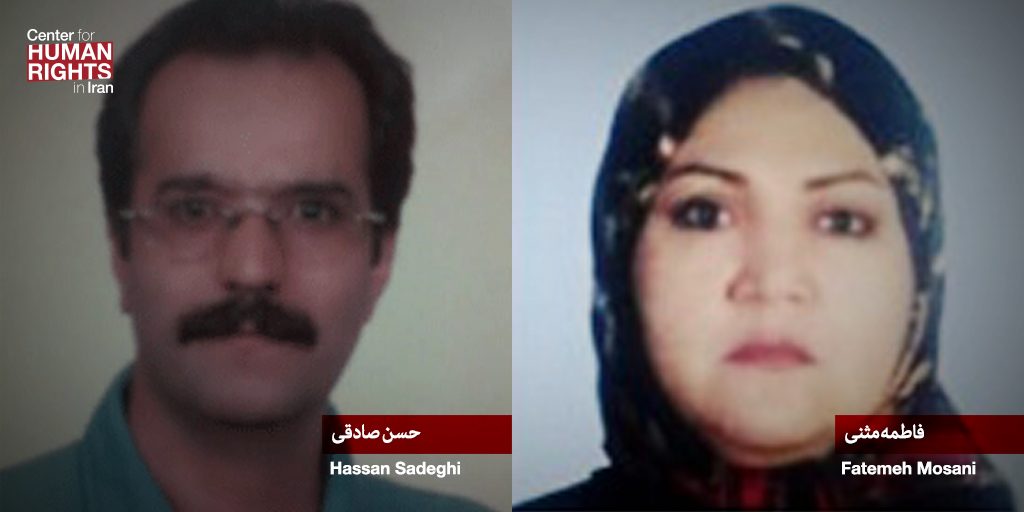Political Prisoner’s Family Faces Homelessness in Iran Due to State Confiscation of Properties

MARCH 21,
2019
Hassan Sadeghi and Fatemeh Mosanna Denied
Medical Treatment
The family of two
political prisoners is facing homelessness now that they’ve received notice
that their family home and only remaining property will be confiscated by the
Iranian government, their son Iman Sadeghi informed the Center for Human Rights
in Iran (CHRI) on March 15, 2019.
“In addition to our house
in Kashan, the authorities have confiscated our shop in Tehran. We have no
other source of income. Now they are putting their hand on our house where we
live in Tehran and if they take that away from us, we will have to live on the
street because we have nowhere else to go,” Sadeghi said.
“Since getting the
confiscation notice we’ve all been more stressed out and my mind is preoccupied
with what to do for my sister and grandmother (who are also living in this
house,” he added.
Since 2015, Hassan Sadeghi
and his wife Fatemeh Mosanna have been serving 15-year prison sentences after
being arrested in January 2013 for allegedly organizing a mourning ceremony for
Hassan Sadeghi’s father Gholamhossein Sadeghi, a high-ranking member of the
banned Mojahedin-e Khalq (MEK) opposition group, which now operates in exile.
Hassan Sadeghi was living
in exile at the time of his death.
The government has
confiscated all of the couple’s properties, including what Hassan Sadeghi had
inherited from his father.
Iranian law allows the
state to confiscate properties under certain conditions, leaving citizens with
no means of legal recourse. However, Sadeghi pointed out that the government’s
efforts to confiscate his family’s home in Tehran are unlawful.
According to the regulations for
the implementation of Article 11 of Iran’s Constitution, the domestic properties of Iranian
expatriates with proven ties to anti-state groups are subject to confiscation.
The regulations add that their heirs in Iran can claim these properties “only
if they do not have proven ties” with anti-state groups.
Article 19 of the same
regulations exempt “a modest residence and the family’s furniture” from
confiscation and explicitly states that the court “should ensure that dependent
family members are provided adequate means to live.”
Iman Sadeghi, 25, told
CHRI his family would become homeless if the state confiscates their home in
Tehran.
“These properties belonged
to my grandfather [Gholamhossein Sadeghi], a member of the Mojahedin-e Khalq,
who left Iran soon after the [1979] revolution,” he said.
He continued: “When my
grandfather died, my father inherited these properties and controlled them for
many years. The court has ruled that these properties should be confiscated
because they belonged to my grandfather. They have already taken almost all my
grandfather’s properties in Kashan and our shop in Tehran where we worked. Now
they want to confiscate the house we are living in.”
Prior to his current
incarceration, Hassan Sadeghi served six years in prison in the 1980s from the
ages of 15 to 21 for allegedly engaging in political activities related to the
MEK. Thousands of political prisoners with alleged links to the MEK were executed without trial during the 1980s as the
Iranian government worked to eliminate the group.
During that time, Hassan
Sadeghi’s wife Fatemeh Mosanna and her mother Ferdows Mahboubi served two and
four years in prison respectively while Fatemeh’s brothers—Ali, Mostafa and
Morteza Mosanna were executed, all for the charge of “collaboration with the
Mojahedin-e Khalq.
People continue to be
imprisoned under lengthy prison sentences to this day in Iran for
allegedly maintaining active links to the MEK.
Iman Sadeghi also told
CHRI that his parents are being denied medical treatment.
He stated: “They are both
suffering from different kinds of illnesses and need treatment but the
authorities are ignoring them and preventing hospitalization. My father
particularly is in bad shape and unable to walk. He has ulcers and back pain. I
got him a hospital appointment at my own expense and they granted him
permission for one visit and the doctor prescribed follow-up sessions but the
authorities didn’t allow him to go back to the hospital.”
Iman Sadeghi said that
most of his parents’ medical problems are related to the imprisonment and
torture they endured as political prisoners in the 1980s. He said that his
father was whipped with cable wires on the soles of his feet and lost partial
vision and Mosanna suffered serious psychological problems that linger to this
day.
Government confiscation of
properties belonging to political prisoners including religious minorities is
not uncommon in Iran.
In July 2017, the
Revolutionary Court in Sardasht, West Azerbaijan Province, ordered the
confiscation of all properties belonging to human rights activists Hiva
Mowlania and Kaveh Khezri. They were accused of “escaping the country and
getting support from foreign media.”
The confiscated properties
included a 5.4-acre orchard, 3.7 acres of agricultural land, and a 50 percent
share of their polyethylene plant in the city of Sardasht.
In July 2016, the largest
Persian-speaking Protestant community in Iran, Jama’at-e Rabbani, announced that it had been stripped of its
ownership of Sharon Gardens, a large and valuable piece of real estate in the
city of Karaj, by an organization operating under the supervision of Supreme
Leader Ali Khamenei.
Two months earlier, a
member of the persecuted Baha’i faith, Ziaollah Motearefi, detailed how the
Iranian government had confiscated 50 hectares of his land in an interview with CHRI.
“If they had told me from
day one that I cannot work in my country because of my religion, I would have
left and spared myself all the hard work,” he said. “I could have worked and
had a comfortable life anywhere in the world. But I stayed here because I love
my country.”
No comments:
Post a Comment